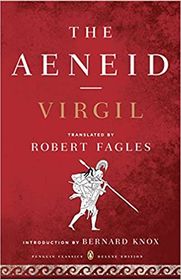The Aeneid


The Aeneid, written by the Roman poet Virgil, is considered one of the greatest works of Latin literature. This epic poem tells the story of Aeneas, a Trojan hero who embarks on a journey to establish a new homeland for his people after the fall of Troy. The Aeneid is a masterpiece of epic poetry that tells a compelling story of heroism, tragedy, and the struggles of human beings to create a better future for themselves.
The Aeneid is a deeply moral poem that explores important themes such as duty, honor, loyalty, and the cost of war. Aeneas, the hero of the story, is a man driven by a sense of duty to his people and his gods. He is a man who is willing to make great sacrifices for the sake of his mission, including leaving behind his beloved Dido, the queen of Carthage. Aeneas is a complex character who is both a warrior and a leader, and Virgil portrays him as a tragic figure who is haunted by the memories of the war and the losses he has suffered.
One of the most remarkable aspects of The Aeneid is Virgil's skill in crafting vivid and powerful imagery. His descriptions of battles, storms, and other dramatic events are evocative and intense, bringing the story to life in a way that few other works of literature can match. The scenes of Aeneas's journey through the underworld, where he speaks with the ghosts of his past, are particularly striking and memorable.
The Aeneid is also a work that grapples with the nature of power and the role of the state in human affairs. Virgil portrays the Roman state as a noble and just institution, founded on the principles of justice and the rule of law. At the same time, he is not blind to the abuses of power that can occur within any society, and he portrays the dangers of unchecked ambition and the desire for glory.
Perhaps the most enduring legacy of The Aeneid, however, is its role in shaping the cultural and intellectual traditions of Western civilization. Virgil's epic has inspired countless works of literature, music, and art, and it has played a pivotal role in the development of Western ideas about heroism, honor, and the role of the individual in society. The influence of The Aeneid can be seen in everything from Dante's Divine Comedy to the works of Shakespeare and Milton.
Overall, The Aeneid is a monumental work of literature that continues to captivate and inspire readers more than 2,000 years after it was written. Virgil's masterful storytelling, powerful imagery, and deep moral insights make this epic poem a true classic of world literature. Anyone with an interest in ancient literature, mythology, or the history of Western civilization would do well to read this timeless masterpiece.